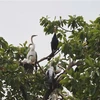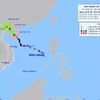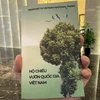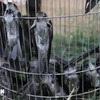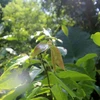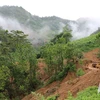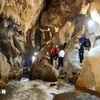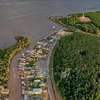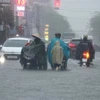A group of biologists have spent days trailing a troop of primates in Kon Ka Kinh National Park, before they eventually caught up with about 30 gray-shanked douc langurs having an afternoon meal in the treetops some 30 metres above the ground.
"I was lucky. Those endangered primates are so afraid of humans, they will run from anything that may threaten them," explained Tran Huu Vy, director of the Biodiversity Conservation Centre - GreenViet. "The existence of such a crowd of langurs is evidence of over effective environmental protection and the park's rich biodiversity," he said.
The 42,000-ha Kon Ka Kinh National Park in the Central Highlands province of Gia Lai has been a safe haven for about 250 gray-shanked douc langurs (pygathrix cinerea) - the world's largest troop living in the central region of Vietnam.
Vy and his German colleagues from the Frankfurt Zoological Society's Vietnam Primate Conservation Programme have pursued a long-term conservation, protection and education programme on the gray-shanked douc langur in the park since 2006.
Experts of Conservation Programme now say the park is home to around 1,000 gray-shanked doucs spread across five provinces, including Quang Nam, Quang Ngai, Binh Dinh, Kon Tum and Gia Lai. Currently, Gia Lai's Kon Ka Kinh Park preserves the largest number of langurs.
"We counted 250 langurs living in the park. We also found species of the most endangered primates living in the park, including three kinds of monkey (Macaca leonia, Macaca artoides and Macara mulatta), two species of loris (Nycticebus bengalensis and Nycticebus pygmaeus) and gibbons (Nomascus leucogienys leucogienys)," Vy said.
The gray-shanked douc langur is listed on the International Union for Conservation of Nature (IUNC) Red List as one of the world's 25 critically endangered primates.
Ha Thang Long, head of the representative office of the Frankfurt Zoological Society in Vietnam, who is an authority on gray-shanked douc studies, began the conservation programme to protect the primate species in 2006.
"Langurs can only be seen in the central region of Vietnam, and Kon Ka Kinh Park conserves the largest number of endangered primates in the country," Long said. "This is why the Frankfurt Zoological Society has come to protect the gray-shanked doucs and the park's rich biodiversity."
He said the Society's conservation programme has provided funding to support rangers in the park since 2010. "We have joined hands with local administrations and the park to raise awareness among local people of the importance of forest and langur protection. We have also hosted field training courses for nearly 200 students from Da Nang's Teachers College since 2006, in an effort to educate younger generations," the biologist said.
Long, 37, said the education programme for college students will help spread awareness of environmental protection of the most endangered primates across generations. In fact, many students from the programme have pursued the study and protection of the doucs.
Nguyen Thi Tinh, 30, who joined the first field training course, has continued flora studies in Kon Ka Kinh Park with the Frankfurt Zoological Society. "I have been going on flora studies since I attended the first training course for students," Tinh said.
"The biodiversity of the 42,000-ha reserve, of which tropical evergreen forest covers 2,000ha, supplies enough food for langurs and other primates. The park's flora shelters primates, while langurs scatter seeds with their movement," she said.
Multiple threats
The park's ranger Nguyen Van Truong says hunting has been a major problem for gray-shanked doucs, but the impact of human activity on habitats will lead to the extinction of the most endangered species. "They and other primate species are hunted for meat and use in traditional medicines. Their bones are used to make glue to treat low appetites, insomnia, and anemia," Truong said.
"Despite local people regularly being in the park, we are yet to find a case of langurs being hunted in the area. Local people have been warned via the education programme from the park and the Frankfurt Zoological Society," he said.
Vice Director of Kon Ka Kinh Park Ngo Van Thang said locals living in buffer zones also benefit from the forest protection programme. "Villagers can increase their income from forest protection, so they abstain from farming and hunting in the forest. They are assigned to protect 8,000ha of land in the park at a cost of 200,000 VND per ha each year," Thang said. "Monthly legal education and communication efforts among ethnic communities have helped raise awareness among local people."
Dinh Duong, 45, and part of the ethnic Ba Na group, said hunting in the area had decreased as local people gradually recognised the importance of protection. "Most of villagers now can earn quite a good income from masonry, afforestation and forest protection. They sometimes also go gathering honey, mushrooms and bamboo shoots," he said. "Some villagers still trap little animals like squirrels and weasels for meat. However, the constant patrols of forest rangers in the park also limit the illegal hunting."
Duong, who has spent 30 years patroling the forest, says the park is still well preserved because it is located in tough terrain, 1,300m above sea level. "I can spot monkeys, loris, wild boar or bears in the forest; but rarely gray-shanked douc langurs," he said.
Duong is the most experienced in tracking langurs, helping experts from the Frankfurt Zoological Society research the endangered primates. "Protecting the park and endangered primates from extinction requires a long term plan and support for local people, who still make huge profits from illegal logging, hunting and over exploitation of honey, mushrooms and medicinal herbs," he warned.
The Frankfurt Zoological Society enables protection of the park by providing education for biology faculty students from Da Nang Teachers College. Field trips to Kon Ka Kinh Park have run in the past eight years, to give work experience to second year and final-year students.
"They will continue researching on the biodiversity or help communicate the importance of nature conservation to younger generations," said Long, head of the Society representative office. "The field trip aims to raise awareness of endangered primates at the park and educate students on how to protect them."
The programme has provided park rangers with facilities and funding for tighter control and protection of the primates. "Rangers receive an allowance and equipment for long patrols every week while they trail the endangered animals and prevent poaching," Long said.
The park's Centre for Education and Environment, together with the Frankfurt Zoological Society, has also held conservation modules at seven junior secondary schools on the park's buffer zone.
"Leaflets and painting contests with nature topics is organised regularly for local students. It gradually provides basic forest knowledge for kids," said the centre's vice director, Dinh Khanh Toan.
Tran Ngoc Son, a lecturer at Da Nang's Teachers College, said field trips had helped students build up practical knowledge for further study, but also provided students with real life-skills.
Quynh Trang, 20, the second year student of biology faculty at the college, says she leant much from field trip to Kon Ka Kinh park. "It's great. I have seen a group of langurs for the first ever time. I and my friends from college just saw those (langurs) through pictures or paintings," Trang said. "We acknowledge the importance of nature protection and endangered species in the park. I would like to spread the message of environmental protection and primate conservation to younger generations when I become a teacher."
GreenViet director said his centre plans to a plantation project to transform the lives of local people living in the park's buffer zone. "We have been seeking funding for the project. Local people can change their crops to profitable Indian Laurel (litsea glutinosa) trees which could earn 30 million VND (1,400 USD) per ha each year from their wood, bark and leaf," Vy elaborated.
"We're aiming to support 1,000 people in Bong Bim in the first stage before the project in neighbouring villages," he said, adding that the project will help local people abstain from illegal hunting or logging in the park.-VNA
"I was lucky. Those endangered primates are so afraid of humans, they will run from anything that may threaten them," explained Tran Huu Vy, director of the Biodiversity Conservation Centre - GreenViet. "The existence of such a crowd of langurs is evidence of over effective environmental protection and the park's rich biodiversity," he said.
The 42,000-ha Kon Ka Kinh National Park in the Central Highlands province of Gia Lai has been a safe haven for about 250 gray-shanked douc langurs (pygathrix cinerea) - the world's largest troop living in the central region of Vietnam.
Vy and his German colleagues from the Frankfurt Zoological Society's Vietnam Primate Conservation Programme have pursued a long-term conservation, protection and education programme on the gray-shanked douc langur in the park since 2006.
Experts of Conservation Programme now say the park is home to around 1,000 gray-shanked doucs spread across five provinces, including Quang Nam, Quang Ngai, Binh Dinh, Kon Tum and Gia Lai. Currently, Gia Lai's Kon Ka Kinh Park preserves the largest number of langurs.
"We counted 250 langurs living in the park. We also found species of the most endangered primates living in the park, including three kinds of monkey (Macaca leonia, Macaca artoides and Macara mulatta), two species of loris (Nycticebus bengalensis and Nycticebus pygmaeus) and gibbons (Nomascus leucogienys leucogienys)," Vy said.
The gray-shanked douc langur is listed on the International Union for Conservation of Nature (IUNC) Red List as one of the world's 25 critically endangered primates.
Ha Thang Long, head of the representative office of the Frankfurt Zoological Society in Vietnam, who is an authority on gray-shanked douc studies, began the conservation programme to protect the primate species in 2006.
"Langurs can only be seen in the central region of Vietnam, and Kon Ka Kinh Park conserves the largest number of endangered primates in the country," Long said. "This is why the Frankfurt Zoological Society has come to protect the gray-shanked doucs and the park's rich biodiversity."
He said the Society's conservation programme has provided funding to support rangers in the park since 2010. "We have joined hands with local administrations and the park to raise awareness among local people of the importance of forest and langur protection. We have also hosted field training courses for nearly 200 students from Da Nang's Teachers College since 2006, in an effort to educate younger generations," the biologist said.
Long, 37, said the education programme for college students will help spread awareness of environmental protection of the most endangered primates across generations. In fact, many students from the programme have pursued the study and protection of the doucs.
Nguyen Thi Tinh, 30, who joined the first field training course, has continued flora studies in Kon Ka Kinh Park with the Frankfurt Zoological Society. "I have been going on flora studies since I attended the first training course for students," Tinh said.
"The biodiversity of the 42,000-ha reserve, of which tropical evergreen forest covers 2,000ha, supplies enough food for langurs and other primates. The park's flora shelters primates, while langurs scatter seeds with their movement," she said.
Multiple threats
The park's ranger Nguyen Van Truong says hunting has been a major problem for gray-shanked doucs, but the impact of human activity on habitats will lead to the extinction of the most endangered species. "They and other primate species are hunted for meat and use in traditional medicines. Their bones are used to make glue to treat low appetites, insomnia, and anemia," Truong said.
"Despite local people regularly being in the park, we are yet to find a case of langurs being hunted in the area. Local people have been warned via the education programme from the park and the Frankfurt Zoological Society," he said.
Vice Director of Kon Ka Kinh Park Ngo Van Thang said locals living in buffer zones also benefit from the forest protection programme. "Villagers can increase their income from forest protection, so they abstain from farming and hunting in the forest. They are assigned to protect 8,000ha of land in the park at a cost of 200,000 VND per ha each year," Thang said. "Monthly legal education and communication efforts among ethnic communities have helped raise awareness among local people."
Dinh Duong, 45, and part of the ethnic Ba Na group, said hunting in the area had decreased as local people gradually recognised the importance of protection. "Most of villagers now can earn quite a good income from masonry, afforestation and forest protection. They sometimes also go gathering honey, mushrooms and bamboo shoots," he said. "Some villagers still trap little animals like squirrels and weasels for meat. However, the constant patrols of forest rangers in the park also limit the illegal hunting."
Duong, who has spent 30 years patroling the forest, says the park is still well preserved because it is located in tough terrain, 1,300m above sea level. "I can spot monkeys, loris, wild boar or bears in the forest; but rarely gray-shanked douc langurs," he said.
Duong is the most experienced in tracking langurs, helping experts from the Frankfurt Zoological Society research the endangered primates. "Protecting the park and endangered primates from extinction requires a long term plan and support for local people, who still make huge profits from illegal logging, hunting and over exploitation of honey, mushrooms and medicinal herbs," he warned.
The Frankfurt Zoological Society enables protection of the park by providing education for biology faculty students from Da Nang Teachers College. Field trips to Kon Ka Kinh Park have run in the past eight years, to give work experience to second year and final-year students.
"They will continue researching on the biodiversity or help communicate the importance of nature conservation to younger generations," said Long, head of the Society representative office. "The field trip aims to raise awareness of endangered primates at the park and educate students on how to protect them."
The programme has provided park rangers with facilities and funding for tighter control and protection of the primates. "Rangers receive an allowance and equipment for long patrols every week while they trail the endangered animals and prevent poaching," Long said.
The park's Centre for Education and Environment, together with the Frankfurt Zoological Society, has also held conservation modules at seven junior secondary schools on the park's buffer zone.
"Leaflets and painting contests with nature topics is organised regularly for local students. It gradually provides basic forest knowledge for kids," said the centre's vice director, Dinh Khanh Toan.
Tran Ngoc Son, a lecturer at Da Nang's Teachers College, said field trips had helped students build up practical knowledge for further study, but also provided students with real life-skills.
Quynh Trang, 20, the second year student of biology faculty at the college, says she leant much from field trip to Kon Ka Kinh park. "It's great. I have seen a group of langurs for the first ever time. I and my friends from college just saw those (langurs) through pictures or paintings," Trang said. "We acknowledge the importance of nature protection and endangered species in the park. I would like to spread the message of environmental protection and primate conservation to younger generations when I become a teacher."
GreenViet director said his centre plans to a plantation project to transform the lives of local people living in the park's buffer zone. "We have been seeking funding for the project. Local people can change their crops to profitable Indian Laurel (litsea glutinosa) trees which could earn 30 million VND (1,400 USD) per ha each year from their wood, bark and leaf," Vy elaborated.
"We're aiming to support 1,000 people in Bong Bim in the first stage before the project in neighbouring villages," he said, adding that the project will help local people abstain from illegal hunting or logging in the park.-VNA
